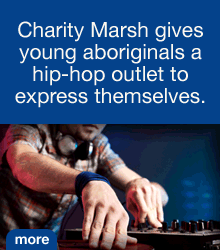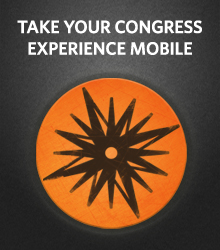Indigenizing the Academy with Dwayne Donald
Milena Stanoeva, Congress 2011 Team
Dwayne Donald is an assistant professor in the Faculty of Education at the University of Alberta and the president of the Canadian Society for the Study of Indigenous Education (CASIE). A recent Big Thinking lecturer, he appears on this year’s Equity Issues Portfolio panel “Indigenous Knowledge and Indigenizing the Academy” on May 31th from 5 pm.
He answered some of our questions on how Canadian institutions can better incorporate and encourage Indigenous knowledge.
From what you’ve discovered in your research and work, what is the biggest issue that academia needs to face with regards to addressing the needs of Indigenous students?
Most people who work in the realm called ‘academia’ have very little understanding of the histories, memories, and experiences of Indigenous people. I find that this lack of understanding results in frequent misrecognition of who Indigenous people are in relation to Canadians. The issue of identity continues to be a common source of tension, with the most insidious example being the residential schools. Indigenous people in Canada continue to suffer from this legacy of having others define and determine who they are and make decision on their behalf in accordance with these troubling definitions.
In the field of education, this lack of understanding and resultant misrecognition creates confusion among practicing teachers, student teachers, and faculty members. They cannot comprehend the spirit and intent of recent curricular initiatives emphasizing Indigenous issues because they do not understand the unique relationship that Indigenous people hold with the British Crown and the Government of Canada, and the historic, legal, constitutional, and Treaty precedents that undergird this unique relationship. This lack of understanding, misrecognition, and resultant incomprehensibility of Indigenous priorities and concerns often manifests itself as resistance, resentment, and a desire to conflate Indigenous issues with multicultural policy to resolve the incomprehensibility.
So, most people working in ‘academia’ need to come to terms with the historic and current character of Indigenous-Canadian relations and see themselves implicated in all that. Careful attentiveness to the complexities of those relations will reveal its uniqueness and provoke inquiries into more ethical understandings of the needs of Indigenous students.
What opportunities do you see for the advancement of Indigenous knowledge in the academy? Are there any particular initiatives or developments that you find encouraging?
There are many opportunities that are quickly emerging. With this emergence, though, comes concern regarding who and what actually benefits from those opportunities. In some ways, academics are trained to exploit research opportunities and ‘sell’ knowledge. It needs to be admitted that, as Indigenous issues garner more and more attention, there is a very real danger that ‘opportunities for advancement’ plays out as an opportunity for academics to further their careers. This can occur at the expense of Indigenous people and communities. So, opportunities for the ‘advancement of Indigenous knowledge in the academy’ should be regarded with caution. The goal should not be to advance the academy; it should be to support and enhance the lives of Indigenous people and bring benefits to their communities.
Another point to consider with regard to this issue is that Indigenous philosophies and ways of knowing constitute more than just ‘knowledge’ as it is commonly conceptualized when following Enlightenment traditions. Knowing and knowledge are only fully meaningful in relation with ontology, cosmology and spirituality, and these understandings must be experienced and enacted in embodied ways rather than just thought about as a purely intellectual endeavour. In my experience, faculty members of First Nations postsecondary institutions provide inspiring leadership in this area, especially with projects focused on land, place, story, language, and ceremony. I have had the opportunity to work in partnership with colleagues working at such institutions and have learned much from them on balancing influences and serving community. Mainstream academia can learn much from this work. The most important teaching I take from these examples is that the emphasis is not on the generation of a research agenda, but instead on supporting people in their efforts to live their lives differently and heal from colonial legacies.
At Congress, you’ll be participating in the “Indigenous Knowledge and Indigenizing the Academy” panel. What are you hoping to highlight at this session? What conversations do you hope to have?
The challenge of Indigenizing the academy involves a fundamental rethinking of the relations linking Indigenous peoples and Canadians. In this talk, I will focus on the need for renewal of miyo-wicihitowin (good relations) based on the original spirit and intent of theTreaties.
I want to talk about large scale philosophical shifts that are required before we begin to see evidence of meaningful participation of Indigenous people in the academy. I want to speak on this rather than piecemeal and isolated suggestions.













